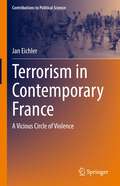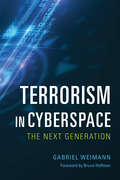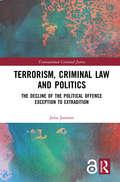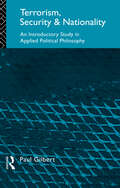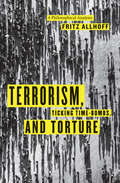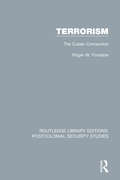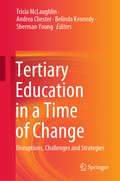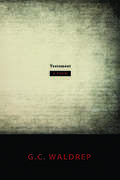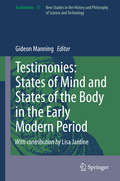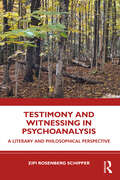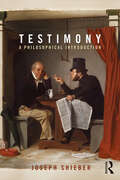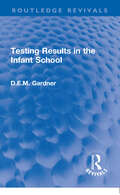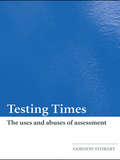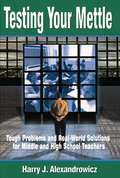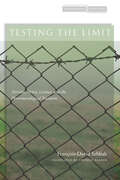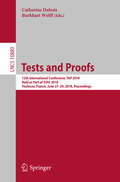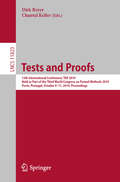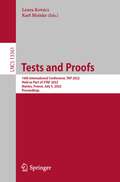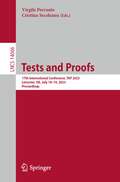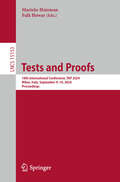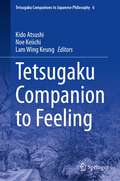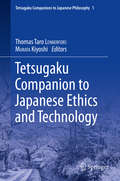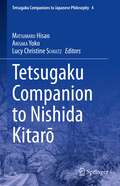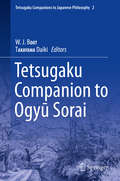- Table View
- List View
Terrorism in Contemporary France: A Vicious Circle of Violence (Contributions to Political Science)
by Jan EichlerThis book examines radical Jihad terrorism in contemporary France and sheds light on the vicious circle of violence, based on reciprocity. Building upon the theoretical heritage of Pierre Bourdieu, the book develops a methodology and a concept of the vicious circle of violence in France, based on three pillars: actors, dynamics, and effects. Discussing the development of global terrorism between the 9/11 attacks and the launch of the European front against global terror in Spain and Great Britain, the book goes on to analyze why France has not been attacked during the 2000s and why it, in turn, became a primary target of terrorist attacks during the 2010s, with a special emphasis on communication theory and the concept of reciprocity. Studying these attacks on the international level, the book offers insights into violent acts of revenge of the radical home-grown jihadists for the French military interventions in four Middle Eastern and North African (MENA) countries, especially Libya and Syria. It further investigates the following growing radicalization of the Muslim community on the national level as a reason for terrorist attacks. Finally, the book sheds light on the reactions from within the French military to these developments, before closing with a presentation of the new political context after the 2022 presidential and legislative elections. Based on empirical evidence and a theoretical background this book will appeal to students and scholars of political science and international relations, as well as policy-makers and practitioners interested in a better understanding of terrorism, French politics, and communication theory.
Terrorism in Cyberspace: The Next Generation
by Gabriel WeimannThe war on terrorism has not been won, Gabriel Weimann argues in Terrorism in Cyberspace, the successor to his seminal Terror on the Internet. Even though al-Qaeda's leadership has been largely destroyed and its organization disrupted, terrorist attacks take 12,000 lives annually worldwide, and jihadist terrorist ideology continues to spread. How? Largely by going online and adopting a new method of organization. Terrorist structures, traditionally consisting of loose-net cells, divisions, and subgroups, are ideally suited for flourishing on the Internet through websites, e-mail, chat rooms, e-groups, forums, virtual message boards, YouTube, Google Earth, and other outlets. Terrorist websites, including social media platforms, now number close to 10,000. This book addresses three major questions: why and how terrorism went online; what recent trends can be discerned—such as engaging children and women, promoting lone wolf attacks, and using social media; and what future threats can be expected, along with how they can be reduced or countered. To answer these questions, Terrorism in Cyberspace analyzes content from more than 9,800 terrorist websites, and Weimann, who has been studying terrorism online since 1998, selects the most important kinds of web activity, describes their background and history, and surveys their content in terms of kind and intensity, the groups and prominent individuals involved, and effects. He highlights cyberterrorism against financial, governmental, and engineering infrastructure; efforts to monitor, manipulate, and disrupt terrorists' online efforts; and threats to civil liberties posed by ill-directed efforts to suppress terrorists' online activities as future, worrisome trends.
Terrorism on Trial: Political Violence and Abolitionist Futures
by Nicole NguyenA landmark sociological examination of terrorism prosecution in United States courts Rather than functioning as a final arbiter of justice, U.S. domestic courts are increasingly seen as counterterrorism tools that can incapacitate terrorists, maintain national security operations domestically, and produce certain narratives of conflict. Terrorism on Trial examines the contemporary role that these courts play in the global war on terror and their use as a weapon of war: hunting, criminalizing, and punishing entire communities in the name of national security. Nicole Nguyen advocates for a rethinking of popular understandings of political violence and its root causes, encouraging readers to consider anti-imperial abolitionist alternatives to the criminalization, prosecution, and incarceration of individuals marked as real or perceived terrorists. She exposes how dominant academic discourses, geographical imaginations, and social processes have shaped terrorism prosecutions, as well as how our fundamental misunderstanding of terrorism has led to punitive responses that do little to address the true sources of violence, such as military interventions, colonial occupations, and tyrannical regimes. Nguyen also explores how these criminal proceedings bear on the lives of defendants and families, seeking to understand how legal processes unevenly criminalize and disempower communities of color. A retheorization of terrorism as political violence, Terrorism on Trial invites readers to carefully consider the role of power and politics in the making of armed resistance, addressing the root causes of political violence, with a goal of building toward a less violent and more liberatory world.
Terrorism, Criminal Law and Politics: The Decline of the Political Offence Exception to Extradition (Transnational Criminal Justice)
by Julia JanssonRecent atrocities have ensured that terrorism and how to deal with terrorists legally and politically has been the subject of much discussion and debate on the international stage. This book presents a study of changes in the legal treatment of those perpetrating crimes of a political character over several decades. It most centrally deals with the political offence exception and how it has changed. The book looks at this change from an international perspective with a particular focus on the United States. Interdisciplinary in approach, it examines the fields of terrorism and political crime from legal, political science and criminological perspectives. It will be of interest to a broad range of academics and researchers, as well as to policymakers involved in creating new anti-terrorist policies.
Terrorism, Security and Nationality: An Introductory Study in Applied Political Philosophy
by Paul GilbertTerrorism, Security and Nationality shows how the ideas and techniques of political philosophy can be applied to the practical problems of terrorism, State violence and national identity. In doing so it clarifies a wide range of issues in applied political philosophy including ethics of war; theories of state and nation; the relationship between communities and nationalisms; human rightss and national security.Paul Gilbert identifies conflicting conceptiona of civil strife by different political communities and investigates notions of terrorism both as unjust war and as political crime. He concludes by considering the proper response of the State to political violence.
Terrorism, Ticking Time-Bombs, and Torture: A Philosophical Analysis
by Fritz AllhoffA provocative philosophical investigation into the ethics of torture, The War on Terror, and making tough choices in exceptional circumstances. The general consensus among philosophers is that the use of torture is never justified. In Terrorism, Ticking Time-Bombs, and Torture, Fritz Allhoff demonstrates the weakness of the case against torture; while allowing that torture constitutes a moral wrong, he nevertheless argues that, in exceptional cases, it represents the lesser of two evils. Allhoff does not take this position lightly. He begins by examining the way terrorism challenges traditional norms, discussing the morality of various practices of torture, and critically exploring the infamous ticking time-bomb scenario. After carefully considering these issues from a purely philosophical perspective, he turns to the empirical ramifications of his arguments, addressing criticisms of torture and analyzing the impact its adoption could have on democracy, institutional structures, and foreign policy. The crucial questions of how to justly authorize torture and how to set limits on its use make up the final section of this timely, provocative, and carefully argued book.
Terrorism: The Cuban Connection
by Roger W. FontaineFirst published in 1988, Terrorism: The Cuban Connection examines Cuba’s involvement in terrorism. With a focus on Havana, the book begins by looking at Cuba’s history and the origins of terrorism. As it progresses, the book traces the development of terrorism and explores Cuba’s connections with other parts of the world, including America, Russia, the Caribbean, South America, the Middle East, and Sub-Saharan Africa. Terrorism: The Cuban Connection is a detailed study, equipped with a wealth of key documents and photographs.
Tertiary Education in a Time of Change: Disruptions, Challenges and Strategies
by Sherman Young Tricia McLaughlin Andrea Chester Belinda KennedyThis book shares exemplary teaching and learning practices from the tertiary sector, and addresses important issues concerning quality, scholarship and innovation in teaching and learning in tertiary settings. It takes on classic issues regarding curricula, technologies and assessment, but approaches them from novel perspectives and using a variety of methodological approaches. Its chapters explore innovative and cutting-edge ideas in tertiary education. Readers will be both challenged and inspired to investigate the ideas discussed further.
Testament
by G.C. WaldrepIn this book-length poem, G.C. Waldrep addresses matters as diverse as Mormonism, cymatics, race, Dolly the cloned sheep, and his own life and faith. Drafted over twelve trance-like days while in residence at Hawthornden Castle, Waldrep responds to such poets as Alice Notley, Lisa Robertson, and Carla Harryman, and tackles the question of whether gender can be a lyric form.G.C. Waldrep's books include Disclamor (BOA Editions Ltd., 2007) and Your Father on the Train of Ghosts (BOA Editions, Ltd., 2011). He lives in Lewisburg, Pennsylvania, where he teaches at Bucknell University, edits West Branch, and serves as editor-at-large for the Kenyon Review.
Testimonies: States of Mind and States of the Body in the Early Modern Period (Archimedes #57)
by Gideon ManningThis book reconnects health and thought, as the two were treated together in the seventeenth century, and by reuniting them, it adds a significant dimension to our historical understanding. Indeed, there is hardly a single early modern figure who took a serious interest in one but not the other, with their attitudes toward body-mind interaction often revealed in acts of self-diagnosis and experimentation. The essays collected here specifically reveal the way experiment and especially self-experiment, combined with careful attention to the states of mind which accompany states of body, provide a new means of assessing attitudes to body-mind interactions just as they show the abiding interest and relevance of source material typically ignored by historians of science and historians of philosophy. In the surviving records of such experimenting on one’s own body, we can observe leading figures like Francis Bacon, Robert Boyle and Robert Hooke, deliberately setting out to repeat pleasurable, or intellectually productive moods and states of mind, by applying the same medicine on successive occasions. In this way we can witness theories of the working of the human mind being developed by key members of an urban culture (London; interregnum Oxford) who based those theories in part on their own regular, long-term use of self-administered, mind-altering substances. It is hardly an overstatement to claim that there was a significant drug culture in the early modern period linked to self-experimentation, new medicines, and the new science. This is one of the many things this volume has to teach us.
Testimony and Witnessing in Psychoanalysis: A Literary and Philosophical Perspective
by Zipi Rosenberg SchipperIn this fascinating volume, Zipi Rosenberg Schipper approaches the fundamental topic of testimony, seeking to recognize its value as a distinct and vital function in psychoanalytic work, separate from its inherited importance to work on trauma. Rosenberg Schipper introduces a revivifying philosophical, linguistic and psychoanalytic approach to the act of testimony, focusing on the role of witnessing in daily life and the importance it has as a therapeutic tool in psychoanalytic and psychological therapy. Throughout, she pinpoints three key psychoanalytic theories on patient testimony. She begins by looking at Freud’s foundational work on testimony as a means of concealing the unconscious and the questions of credibility in the consulting room this creates before looking at Winnicottian and Kohutian theories, whereby therapists take everything the patient says as a definitive truth. She concludes by looking at the Intersubjective and Relational schools of thought, where the therapist assumes the role of witness. By providing a comprehensive overview of the conflicting theories on the topic, Rosenberg Schipper equips practicing psychoanalysts and analysts-in-training with the tools necessary to utilize this vital therapeutic device and engage with it in treatment for all patients.
Testimony: A Philosophical Introduction
by Joseph ShieberThe epistemology of testimony has experienced a growth in interest over the last twenty-five years that has been matched by few, if any, other areas of philosophy. Testimony: A Philosophical Introduction provides an epistemology of testimony that surveys this rapidly growing research area while incorporating a discussion of relevant empirical work from social and developmental psychology, as well as from the interdisciplinary study of knowledge-creation in groups. The past decade has seen a number of scholarly monographs on the epistemology of testimony, but there is a dearth of books that survey the current field. This book fills that gap, assessing the strengths and weaknesses of all major competing theories. All chapters conclude with Suggestions for Further Reading and Discussion Questions.
Testing Results in the Infant School (Routledge Revivals)
by D.E.M. GardnerFirst published in 1942, Testing Results in the Infant School describes an attempt to measure objectively the results of education in Infant schools where children are free to move and speak and play, as compared with schools of a more formal and traditional type. The book explains in detail the variety of tests used, the reasons behind them, and the children’s reactions to them. It concludes with an evaluation of the results and suggestions for their bearing on educational practice. It will appeal to those with an interest in the history, theory, and psychology of education.
Testing Times: The Uses and Abuses of Assessment
by Gordon StobartAssessment dominates our lives but its good intentions often produce negative consequences. An example that is central to this book is how current forms of assessment encourage shallow ‘for-the-test’ learning. It is true to say that as the volume of assessment increases, confidence in what it represents is diminishing. This book seeks to reclaim assessment as a constructive activity which can encourage deeper learning. To do this the purpose, and fitness-for–purpose, of assessments have to be clear. Gordon Stobart critically examines five issues that currently have high-profile status: intelligence testing learning skills accountability the ‘diploma disease’ formative assessment Stobart explains that these form the basis for the argument that we must generate assessments which, in turn, encourage deep and lifelong learning. This book raises controversial questions about current uses of assessment and provides a framework for understanding them. It will be of great interest to teaching professionals involved in further study, and to academics and researchers in the field.
Testing Your Mettle: Tough Problems and Real-World Solutions for Middle and High School Teachers
by Harry J. AlexandrowiczIn this straightforward guide to what really happens in classrooms and hallways, veteran teacher and administrator Harry J. Alexandrowicz makes “reality training” available to both novice and experienced teachers. Alexandrowicz draws from his 28 years’ experience in schools to help prepare teachers to handle the inevitable legal, philosophical, and common-sense challenges they face every day. These challenges are presented as brief vignettes followed by four possible solutions with space for the educators to write their proposed actions, followed by sections on what actually happened, and why. The kinds of scenarios you will learn about include: A parent threatens you You witness students hazing another student You discover a gun in a student’s locker The school’s best athlete is failing your class You see inappropriate student behavior outside the classroom. This accessible “insider’s” view of the classroom will be an essential resource for teachers, administrators, and parents who want to gain valuable insights into how to handle what really happens in schools today.
Testing the Limit: Derrida, Henry, Levinas, and the Phenomenological Tradition
by Sebbah François-DavidIn exploring the nature of excess relative to a phenomenology of the limit,Testing the Limitclaims that phenomenology itself is an exploration of excess. What does it mean that "the self" is "given"? Should we see it as originary; or rather, in what way is the self engendered from textual practices that transgress-or hover around and therefore within-the threshold of phenomenologial discourse? This is the first book to include Michel Henry in a triangulation with Derrida and Levinas and the first to critique Levinas on the basis of his interpolation of philosophy and religion. Sebbah claims that the textual origins of phenomenology determine, in their temporal rhythms, the nature of the subjectivation on which they focus. He situates these considerations within the broader picture of the state of contemporary French phenomenology (chiefly the legacy of Merleau-Ponty), in order to show that these three thinkers share a certain "family resemblance," the identification of which reveals something about the traces of other phenomenological families. It is by testing the limit within the context of traditional phenomenological concerns about the appearance of subjectivity and ipseity that Derrida, Henry, and Levinas radically reconsider phenomenology and that French phenomenology assumes its present form.
Tests and Proofs: 12th International Conference, TAP 2018, Held as Part of STAF 2018, Toulouse, France, June 27-29, 2018, Proceedings (Lecture Notes in Computer Science #10889)
by Catherine Dubois Burkhart WolffThis book constitutes the refereed proceedings of the 12th International Conference on Tests and Proofs, TAP 2018, held as part of STAF 2018, in Toulouse, France, in June 2018. The 8 regular papers, 2 short papers, 1 invited paper and 1 invited tutorial presented in this volume were carefully reviewed and selected from 18 submissions. The TAP conference promotes research in verification and formal methods that targets the interplay of proofs and testing: the advancement of techniques of each kind and their combination, with the ultimate goal of improving software and system dependability.
Tests and Proofs: 13th International Conference, TAP 2019, Held as Part of the Third World Congress on Formal Methods 2019, Porto, Portugal, October 9–11, 2019, Proceedings (Lecture Notes in Computer Science #11823)
by Dirk Beyer Chantal KellerThis book constitutes the refereed proceedings of the 13th International Conference on Tests and Proofs, TAP 2019, held as part of the Third World Congress on Formal Methods 2019, Porto, Portugal, in October 2019. The 10 regular papers and 2 invited paper presented in this volume were carefully reviewed and selected from 19 submissions. The TAP conference promotes research in verification and formal methods that targets the interplay of proofs and testing: the advancement of techniques of each kind and their combination, with the ultimate goal of improving software and system dependability.
Tests and Proofs: 16th International Conference, TAP 2022, Held as Part of STAF 2022, Nantes, France, July 5, 2022, Proceedings (Lecture Notes in Computer Science #13361)
by Karl Meinke Laura KovácsThis book constitutes the proceedings of the 16th International Conference on Tests and Proofs, TAP 2022, which was held as part of Software Technologies: Applications and Foundations, STAF 2022, and took place in Nantes, France in July 2022.The 6 full papers together with 1 invited extended abstract included in this volume were carefully reviewed and selected from 11 submissions. They were organized in topical sections on formal analysis, and proofs, and effective testing.
Tests and Proofs: 17th International Conference, TAP 2023, Leicester, UK, July 18–19, 2023, Proceedings (Lecture Notes in Computer Science #14066)
by Cristina Seceleanu Virgile PrevostoThis book constitutes the proceedings of the 17th International Conference, TAP 2023, as part of STAF 2023, a federation of conferences on Software Technologies, Applications and Foundations, which includes two more conferences besides TAP: ICGT (International Conference on Graph Transformations), and ECMFA (European Conference on Modelling Foundations and Applications) in Leicester, UK, in July 2023. The 8 full papers together with 2 short papers included in this volume were carefully reviewed and selected from 14 submissions. They were organized in topical sections on Low-level Code Verification, Formal Models, Model-based test generation, and Abstraction and Refinement.
Tests and Proofs: 18th International Conference, TAP 2024, Milan, Italy, September 9–10, 2024, Proceedings (Lecture Notes in Computer Science #15153)
by Marieke Huisman Falk HowarThis book constitutes the proceedings of the 18th International Conference on Tests and Proofs, TAP 2024. TAP 2024 took place in Milan, Italy, on September 9 and 10, 2024 as part of the Formal Methods symposium (FM 2024), which included four more co-located conferences besides TAP: FMICS (Formal Methods in Industrial Critical Systems), LOPSTR (In ternational Symposium on Logic-based Program Synthesis and Transformation), PPDP (International Symposium on Principles and Practice of Declarative Pro gramming), and FACS (International Conference on Formal Aspects of Compo nent Software. The 7 full papers together with 1 short paper included in this volume were carefully reviewed and selected from 14 submissions. TAP’s scope encompasses many aspects of verification technology, including foundational work, tool development, and empirical research.
Tetsugaku Companion to Feeling (Tetsugaku Companions to Japanese Philosophy #6)
by Kido Atsushi Noe Keiichi Lam Wing KeungThis edited volume is the first in English that covers the philosophy of feeling and related topics in Japanese philosophy on Nishida Kitarō and fellow thinkers. Part I focuses on Nishida Kitarō’s philosophy of feeling, including, but not limited to, comparisons with Tanabe Hajime, Koyama Iwao, and provides coverage of Buddhist, moral and Chinese philosophy. Part II goes beyond Kitarō into topics such as Japanese aesthetics, Nietsche’s reception in Japan, and the philosophy of AI. This is a comprehensive scholarly text on feeling in Japanese philosophy, aimed at researchers and students working in the field.
Tetsugaku Companion to Japanese Ethics and Technology (Tetsugaku Companions to Japanese Philosophy #1)
by Thomas Taro Lennerfors Kiyoshi MurataThis book explores the relevance of Japanese ethics for the field of ethics of technology. It covers the theories of Japanese ethicists such as Nishida Kitarō, Watsuji Tetsurō, Imamichi Tomonobu, Yuasa Yasuo, as well as more contemporary ethicists, and explores their relevance for the analysis of energy technologies, ICT, robots, and geoengineering. It features contributions from Japanese scholars, and international scholars who have applied Japanese ethics to problems in the global condition. Technological development is considered to cause new ethical issues, such as genetically modified organisms fostering monocultures, nanotechnologies causing issues of privacy, as well as health and environmental issues, robotics raising issues about the meaning of humanity, and the risks of nuclear power, as witnessed in the Fukushima disaster. At the same time, technology embodies a hope for mankind, such as ICT improving relationships between human beings and nature, and smart systems assisting humans in leading a more ethical and environmentally friendly life. This book explores these ethical issues and their impact from a Japanese perspective.
Tetsugaku Companion to Nishida Kitarō (Tetsugaku Companions to Japanese Philosophy #4)
by Hisao Matsumaru Yoko Arisaka Lucy Christine SchultzThis book offers the first comprehensive collection of essays on the key concepts of Kitaro Nishida (1870-1945), the father of modern Japanese philosophy and founder of the Kyoto School. The essays analyze several of the major philosophical concepts in Nishida, including pure experience, absolute will, place, and acting intuition. They examine the meaning and positioning of Nishida’s philosophy in the history of philosophy, as well as in the contemporary world, and discuss the relevance of his philosophy in the present context. The book next looks at the significance of Nishida’s philosophy in the wider contexts of science, arts, and religion. The book includes a glossary of key terms that have been translated in a unified manner throughout the volume.
Tetsugaku Companion to Ogyu Sorai (Tetsugaku Companions to Japanese Philosophy #2)
by W. J. Boot Daiki TakayamaThis book contains short analyses (kaidai) of Ogyū Sorai’s (1666-1728) most important works, as well as a biography and a number of essays. The essays explore various aspects of his teachings, of the origins of his thought, and of the reception of his ideas in Japan, China, and Korea before and after "modernization" struck in the second half of the nineteenth century. Ogyū Sorai has come to be considered the pivotal thinker in the intellectual history of Early Modern Japan. More research has been done on Sorai than on any other Confucian thinker of this period. This book disentangles the modern reception from the way in which Sorai's ideas were understood and evaluated in Japan and China in the century following his death. The joint conclusion of the research of a number of the foremost specialists in Japan, Taiwan, and the West is that Sorai was and remains an original, innovative, and important thinker, but that his position within East-Asian thought should be redefined in terms of the East-Asian tradition to which he belonged, and not in the paradigms of European History of Philosophy or Intellectual History. The book represents up-to-date scholarship and allows both the young scholar to acquaint himself with Sorai, and the intellectual historian to compare Sorai with other thinkers of other times and of other philosophical traditions.
